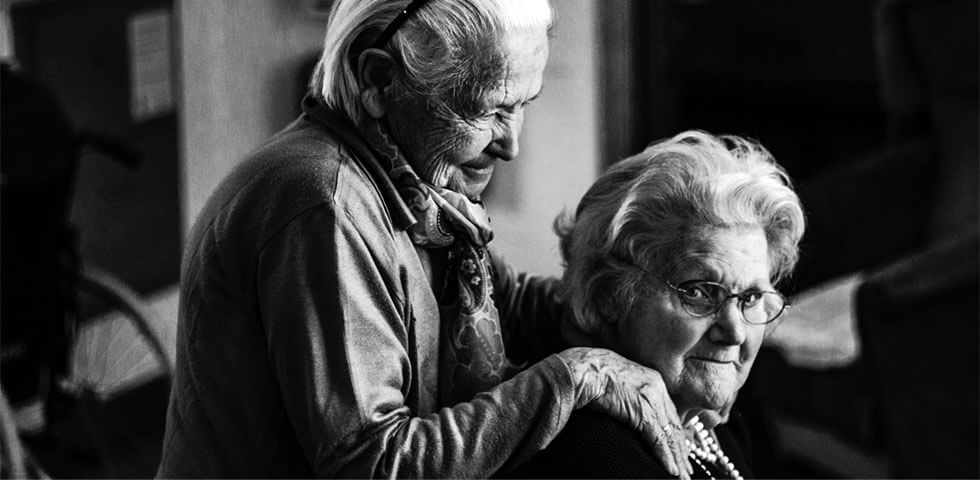Grief is the natural and expected reaction to any kind of loss, not just another person’s death. A person will inevitably experience grief any time they lose something in which they have invested their time, energy, emotions, or dreams. Grief is the complex process of experiencing emotional, physical, psychological, behavioral, social, and spiritual reactions to loss.
While it is an inevitable reality for all of us, older people have unique and often worse effects from loss.
- Grief often has an impact on physical health at any age, but older people are at a much higher risk for severe health problems due to increased stress levels combined with current health conditions and natural physical aging processes.
- Appetite changes can be a concern for grieving individuals at any age. Many people already experience decreased appetite as they get older, which makes it more likely for older adults to skip meals and even go days without eating during bereavement.
- Confusion is a common effect of grief. For an older person, this can be more intense and additionally include forgetfulness, disorientation, and disorganization. The cognitive side effects combined with increased financial pressure especially with the loss of a spouse can develop into high-stress financial difficulties.
- Finally, isolation and loneliness are pervasive issues among older people. When someone they love dies, this loneliness only becomes more intense. Social isolation drastically increases the risk of premature death from every cause for every race, and the risk presented is similar in magnitude to that of obesity, smoking, lack of access to care, and physical inactivity.
Not only do older adults suffer in more intense ways, they also tend to suffer alone. Unfortunately, the times and culture that raised today’s older people created the unrealistic and painful mindset of “picking oneself up by the bootstraps” and essentially dealing with difficult emotions without help. Additionally, society tends to ignore the multiple and dynamic losses of older people, almost as though we expect them to get used to loss and not experience grief as intensely as someone younger with less experience with loss and death.
The inherent challenge of living a long life is that we lose many of our most important people (parents, siblings, spouses, friends, sometimes even children). There also tends to be a high degree of anticipatory grief for people who are still living, as these people may receive health diagnoses including Alzheimer’s, other causes of dementia, and cognitive impairment. These conditions cause changes in personality and ability to communicate, leading to ambiguous loss, and individuals with these diagnoses frequently end up institutionalized (long term hospitalizations, and placements in memory care units or skilled nursing facilities). It is also likely older people may begin to lose a lot of the independence they have spent their entire adult lives enjoying, Older people are usually faced with the loss of ability and health, ultimately leading to the loss of careers, homes, personal possessions, vacations, pets, driver’s licenses, and overall sense of life purpose. This rapid accumulation of losses is profound and will lead to “bereavement overload,” making it nearly impossible for one to accept and process one loss before another occurs.
Some important things to consider particularly helpful when supporting an older person during bereavement include:
- Keep them company. Spending time together, whether it’s meeting for tea, watching a TV show together, or just spending time on the phone, can help the person feel less lonely and decrease the negative effects of social isolation.
- Do not avoid the topic of their loved one who died. Open the door for them to process their grief by sharing their memories and emotions by offering a memory of your own or expressing curiosity to know more about the person.
- Support them with daily tasks like picking up groceries, cooking a meal, assist with paperwork, or take them to doctor’s appointments. Often, people who are grieving don’t know what to ask for when they are told, “please let me know if there is anything I can do.” Pick something you are comfortable doing and do it without waiting to be asked.
- Keep helping long-term. Most people receive a lot of support and help initially, especially immediately after the death and funeral. That support quickly dwindles, and the months and years after the loss become difficult and lonely, especially around anniversaries, birthdays, and holidays. Keep in touch and keep helping with those things you are comfortable helping with.
- Remind them that grief counseling exists and can be incredibly helpful. Having someone to talk to week after week about the grief rollercoaster they are on can be helpful not only in processing and healing, but also in limiting the negative effects of social isolation.
Our therapists are available to provide grief counseling to you and your family in-person or virtually. Call us at 302-635-0505 to set up an appointment to meet with one of our grief and trauma specialists.

